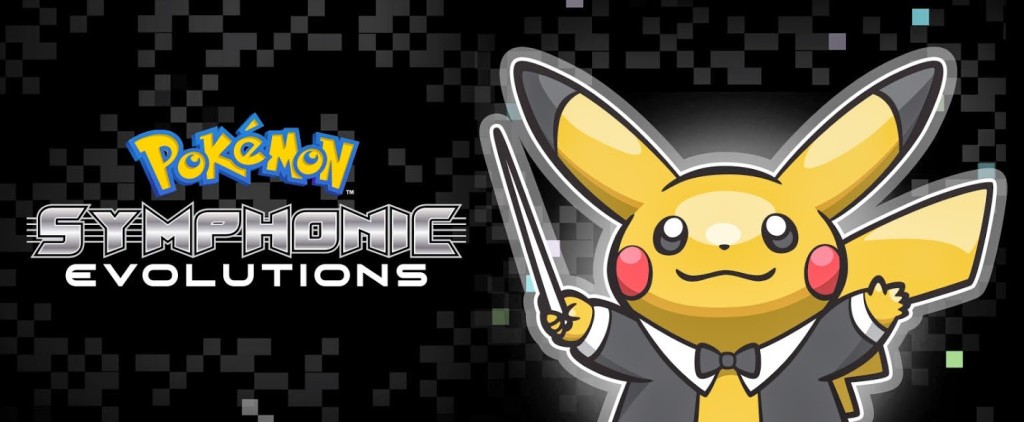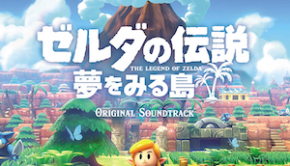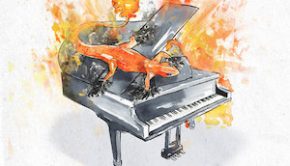Jeron Moore & Chad Seiter Interview: Bringing Pokémon to Orchestra
Fans of video game music concerts will have undoubtedly run into Jeron Moore and Chad Seiter’s work. Both were responsible for conceptualizing and developing The Legend of Zelda: Symphony of the Goddesses and are now in charge of Pokémon: Symphonic Evolutions. Both composers have also been extensively involved in other projects: Moore as a producer, director, and editor on various film and game projects, Seiter as an assistant composer to Michael Giacchino and the composer of LEGO Jurassic World and ReCore.
In this interview, Moore and Seiter explore their experiences bringing the world of Pokémon to a symphonic concert, while touching upon their creative processes while working on a touring show. Along the way, they also speak briefly on their inspirations and their delightful encounters with the Pokémon fanbase.
Interview Credits
Interview Subject: Jeron Moore, Chad Seiter
Interviewer: Julius Acero
Editor: Julius Acero, Chris Greening
Coordination: Julius Acero, Chris Greening
Interview Content
Julius: First of all, thank you for having me here at the LA performance of Pokémon: Symphonic Evolutions. From what I’ve seen and heard of the concert, it looks to be another success for you and your team. How was the process of taking such a beloved franchise such as Pokémon and translating it onstage for this concert?
Jeron Moore: The process was fairly straightforward. As with everything Chad and I like to do, when we’re arranging and translating a series to an orchestra and to the stage we like to be as genuine and authentic as possible and we want the fans to feel like this is for them. This is something made for the fans, by the fans. And bringing the Pokémon franchise to life in this way was a very close and heartfelt collaboration with The Pokémon Company and with game director and composer Junichi Masuda. It was a lot of fun, was really exciting, and was a genuine joy and pleasure to do.
Julius: Chad, you’ve had a background with composing and arranging. Could you walk me through your history in a few words?
Chad Seiter: Yeah! I’ve had the opportunity to work on some really amazing film and television projects, and some truly exceptional game projects. It’s great to have had such a unique assortment of experience, and I feel like it really gives me the skills and confidence I need to really produce something amazing, like this show.
Julius: What are some of your inspirations when it comes to music and interactive mediums, be it film or video games, and is there anything that has influenced the music of tonight’s performance?
Chad Seiter: Jeron and I are very copacetic when it comes to the music that we like and that has inspired us. I draw a lot of inspiration from the film music I grew up listening to, and I also heard a lot of 8-bit music and 16-bit music, and would think, “Wow, I love this, but it would be so cool to hear this the way Jerry Goldsmith did it, or the way James Horner did it.” It’s funny, because in a lot of my projects you get a lot of Goldsmith influence in the music, but I think on this one there’s a lot of influence from Horner.
Jeron Moore: Which was always exciting and fun, and it really tickled Chad and I, to pay a sort of quiet tribute to one of our favorite composers. It’s sort of taken on an even deeper meaning now that he’s passed away. But it’s definitely cool, and art inspires art. You’re going to find tidbits of other things in anyone’s work. Lots of Prokofiev…
Chad Seiter: Yeah, lots of Prokofiev. There’s also a lot of classical stuff. It’s hard to make art without repeating what you love. (Laughs).
Julius: So how did the collaboration with The Pokémon Company come about, and what was the process of working alongside them for Pokémon: Symphonic Evolutions?
Jeron Moore: We had the opportunity to work with the Pokémon Company to bring this idea to life and we were excited when they expressed equal enthusiastic interest in doing so. And as for the process, the Pokémon Company is very detail-oriented and they like to see the overall plan and that made it really easy, because that’s how Chad and I naturally work. We work from kind of a global, macro level and then we get into the micro. And so we were very compatible with each other. Essentially it was a grand collaboration between our teams, between what our vision for the project was and then what we could do to accommodate their sensitivities with the brand and roll out something that was really special for the fans.
Julius: Jumping off what Jeron mentioned, how do you guys work together on a concert like this? How do you take specific scenes and music from the game and transition it to the orchestra?
Chad Seiter: Jeron and I have such a massive love of film and that leads us to spend a lot of time thinking about storytelling. So when we do these shows, our first and foremost concern is to make sure that we are telling the story properly. What we kind of do, on a more technical level, is we plot out the games and sort of analyze the main story points, which generally have music associated with them. Eventually, we made this gigantic Excel document of how the games’ story flowed, and all the pieces of music that were in it. It’s tough, because there’s so much Pokémon music! It’s difficult to take all those hours of music and truncate it down to a 90 minute show. So each generation is represented in approximately 8-10 minutes, and picking our favorites and finding out which ones work best with the orchestra, and which ones tell the story appropriately is quite a huge task!

Julius: And is telling that story a bit harder with Pokémon, since it’s such a traditional RPG experience? Especially the first few games, which feature scenes that leave a lot to the imagination. Is it hard to transfer that on stage, visually and musically?
Chad Seiter: I don’t think so. It doesn’t really matter what kind of game it is, the nice thing is that a story is a story.
Jeron Moore: And part of that is, how did we feel when we were playing it? And really, that emotional feedback is super, super important and is instrumental at defining the direction of the music and the visuals. It’s almost like reverse filmmaking in a way. You have to get all those ingredients into place and trace around them in a way that works for the orchestra and works on the screen, and most importantly, is all put together in a way that works for the audience.
Julius: Since Pokémon is such a massive library of games, was it difficult to select a few pieces and scenes from these games and coalesce them all into the symphony?
Jeron Moore: Again, one of the grounding, more important aspects that Chad and I like to focus on is story, and with Pokémon Symphonic Evolutions, it lent itself towards smaller vignettes, which allowed us to tell a lot of little stories versus telling a big, overarching story…
Chad Seiter: Or operatic stories…
Jeron Moore: Yeah, and in it of itself it allows us to modularize the program more, which of course makes refreshing it or expanding upon it a lot easier when moving forward to additional seasons. But again, it’s all about story for us, and in examining each generation in the Pokémon franchise we really had to spend a lot of time exploring what made those games important and what were the fun, memorable moments of each one and balancing that with what music tracks fans want to hear, which ones are our favorites, and how we average all that out into something that makes sense. It takes time, and it’s definitely a process, but it’s one that once you go through it you end up with a better product.
Julius: On a technical level, a very interesting element, that’s very atypical from other symphonies is the fact that you used an electronic backing track in several of the pieces. How did you go about with that creative decision and how did you sync that up with the symphony?
Chad Seiter: You know, we were kind of looking for something new and cool to do, and it’s something that I always wanted to explore musically. I just find that Pokémon has so much energy, and I thought it’d be really cool to find a new way to translate that energy into the music. It is very different, and we’re still running into technical hurdles getting it out the door from time to time, but it’s turning out really great, and we’re getting a lot of positive feedback from it. Everyone seems to really enjoy it.
Julius: Very cool. How does the editing process of live video with performed music work? What kind of programs or techniques do you employ?
Jeron Moore: There’s a lot programs that go in to making this whole thing come together, from the music side, to the visual side, to the actual live execution side. When it comes to the live execution, there are multiple things running at once. It takes a team of three or four to manage that and coordinate it backstage and with the live cameramen out in the hall or out in the venue. Something cool that we’ve added to the production of Pokémon, which we didn’t have in our previous productions, is that we’ve got really cool high-definition lipstick cameras that we set up on tripods so that gives us the ability to have even more coverage of areas on the stage that we normally wouldn’t. We have dedicated a reverse shot of the conductor that’s typically on the back of the stage looking towards the audience, so you get a really cool shot of the conductor. You’ve got some cool percussion shots, and different instruments around the stage.
Julius: And you combine this with in-game footage…
Jeron Moore: We worked directly with the Pokémon Company to get some of the video for the later games, and we captured some of the earlier games directly in house. We were able to get an actual 3DS Dev Kit and capture system to do some of that on our end. So that was great! With video we used Adobe Premiere to edit all the video. We have several different devices that we used to capture video. Then backstage they’re using QLab, and a bunch of really cool tools, Pro Tools for instance, and others to make it all happen.
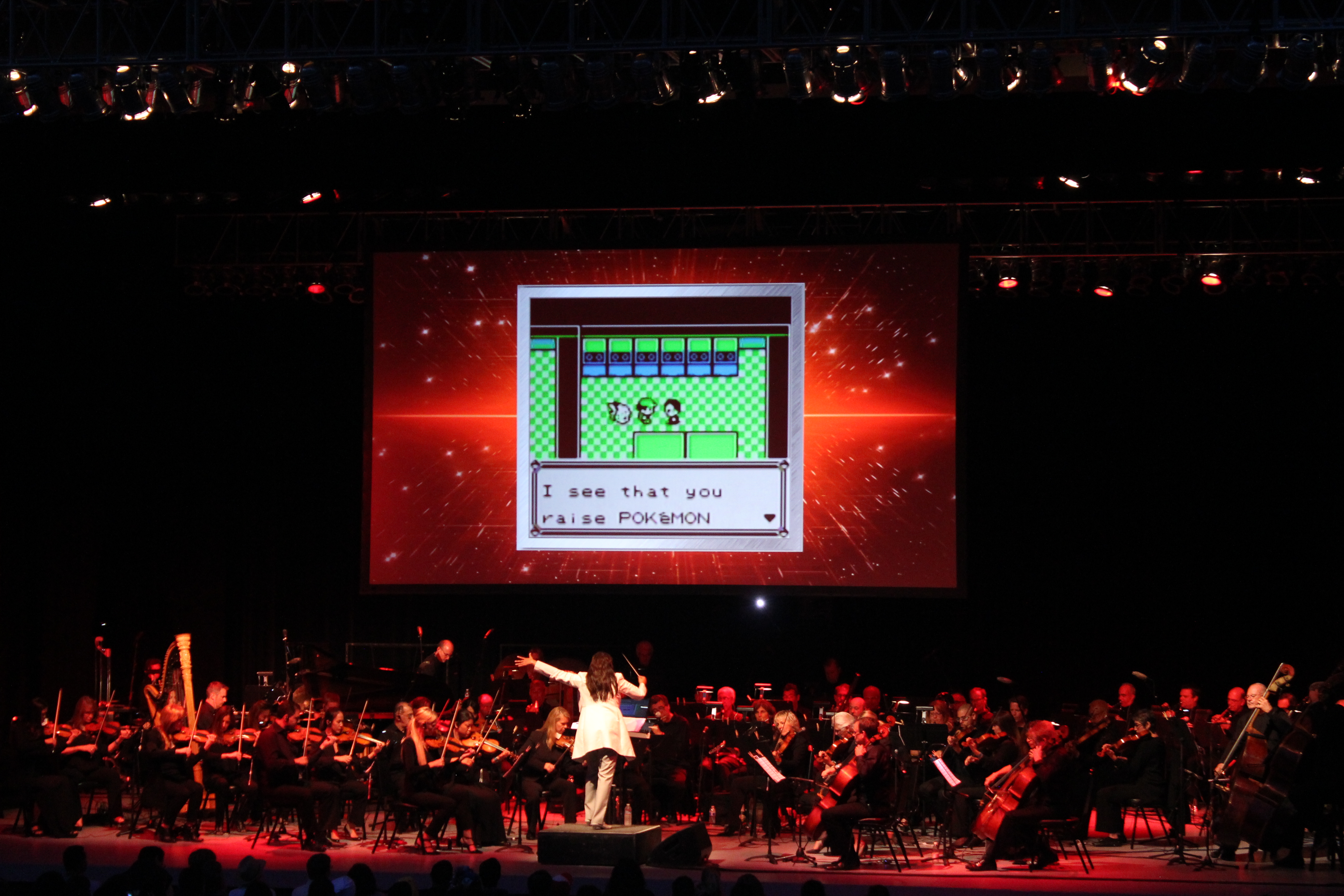
Julius: And what does the music prep involve?
Jeron Moore: With Chad, he works with Digital Performer to do all the music, and he’s got an intricate set-up and tools that help him mock the concert up in a way that all of us, who don’t understand what he’s doing, can understand it. And then he goes to work with another tool called Sibelius that allows him to go into full orchestration mode, and really flesh it out so that it’s ready to go to music prep. I’m glad everyone knows what they’re doing, cause if one person didn’t it wouldn’t all come together. (Laughs) I talked for Chad! Just sit back and enjoy the ride, Chad.
Chad Seiter: (Laughs)
Julius: What is your experience with the Pokémon franchise? What games have you played? What’s your favorite game or generation of games? Any favorite Pokémon?
Jeron Moore: Red, Blue and Yellow came out when I was a sophomore in high school. I had put my Game Boy down around that time and was instead into PC gaming. However I did have a lot of family and cousins that were playing Pokémon, and I did get into Pokémon Blue for a while. I didn’t keep up with it, but that was definitely my first experience, and being the first game in the series, it left an impression. It wasn’t until later that I got more involved as a gamer in the franchise with Black & White and X & Y, and I also re-experienced things with OmegaRuby & AlphaSapphire. And as for my favorite Pokémon, it’s split between some of the starters… between Mudkip and Chespin.
Chad Seiter: I was a little different, because I’m a big RPG fan. I love them all, so I spent quite a bit of time with Pokémon growing up, even though I was a PC gamer too, but I always came back to it. I had Red (laughs). I’ve been playing X & Y again, and that one has been a lot of fun, especially seeing how much it’s grown in the past 19 years. It’s kind of amazing to see how much it’s changed.
Julius: Is there any piece from tonight’s concert that you are especially proud of?
Chad Seiter: I always like to say that all the pieces are like my children and that they’re all special and unique and I love them in different ways. I do, however, have a few favorites from tonight. “The Lake Guardians” from Diamond, Pearl and Platinum, which features the legendries Uxie, Mesprit, and Azelf is a particular favorite. And I also really like “The Ancients of Hoenn,” from Ruby, Sapphire, and Emerald. And… we also have a very special encore that most people know by heart… that turned out pretty rad.
Julius: (Laughs) I’m actually really excited about that one.
Jeron Moore: It’s really cool. (Laughs)
Julius: Has there been any special moment with this tour that has stood out to you, especially with interacting with such a huge global fan base that just love this franchise? How have you interacted with fans, both young and older players?
Chad Seiter: It’s amazing how social of an audience this is. And they’re all incredibly friendly and everyone has stories to share about how important Pokémon has been for them. It’s been cool to be part of this community that we’re now exploring finally!
Jeron Moore: Yeah, Pokémon fans are awesome! I think inherently the games are very social, it encourages a lot of fantastic values, like teamwork, fair play, trust, and cooperation. I think that really translates into the fandom and into the audience that we bring in. And everyone has a great time and it’s an opportunity for fans to meet other fans. Pokémon events do happen, but it’s not as often that they happen on this kind of a scale, it’s usually only with big league events. So this is a chance to participate in a community event like that, on a grander scale.
Julius: What other projects do you have in the works? Anything that you’d be willing to share? Anything that you’re excited to work on in the future?
Jeron Moore: Chad and I do have several things that we want to work on, and are currently working on. Of course, as it is in the industry, you kind of have to keep a lid on things until you’re able to announce them. And Chad and I were really excited to work on Pokémon, and we started brainstorming and generating our outline for it when we were amidst our last project. And it really wasn’t until we had gotten to the point where it was time to announce Pokémon: Symphonic Evolutions that we could really talk about it. That said, Chad and I hope that we can announce some of our next work soon..
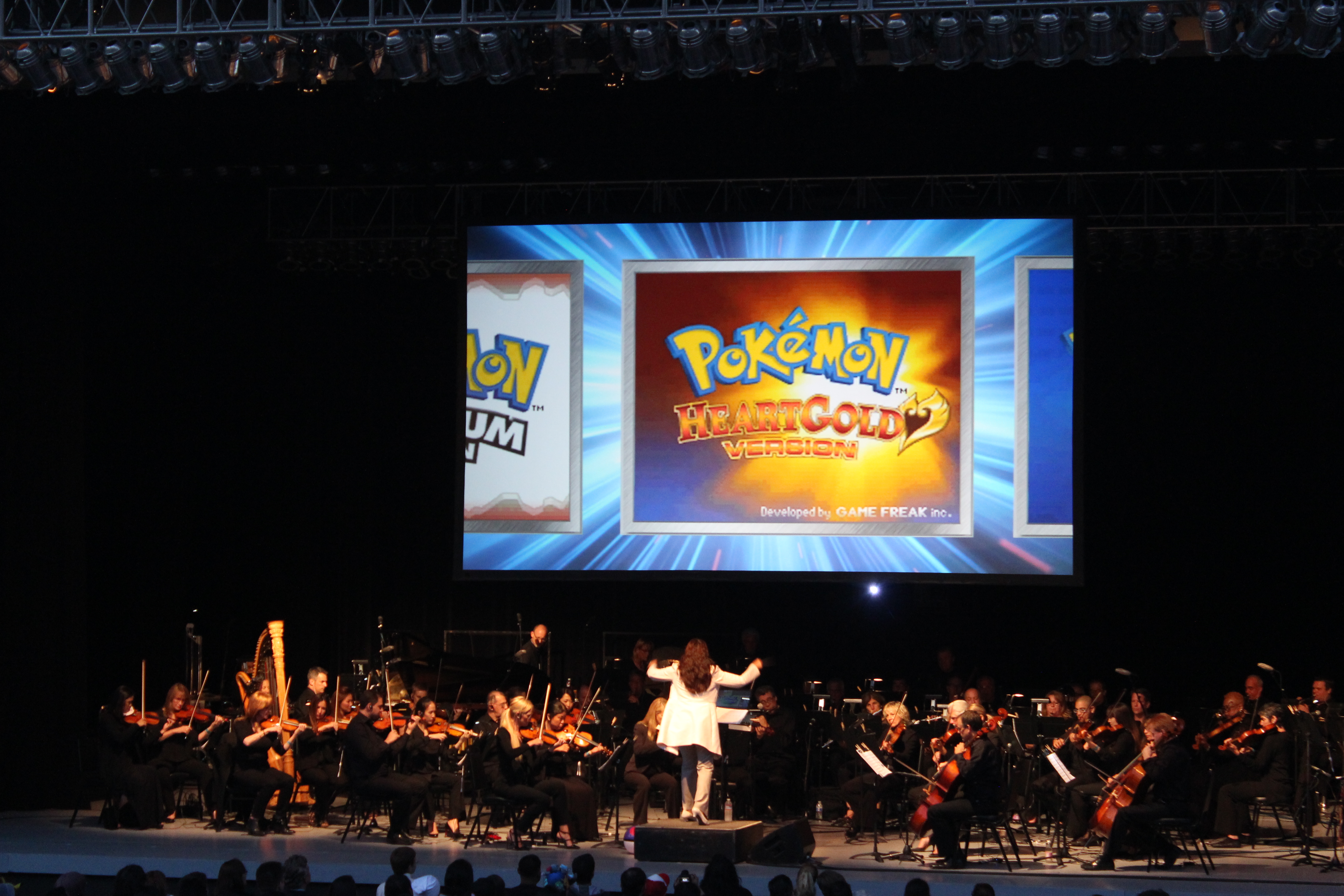
Julius: Do you have any general advice to share for young artists, musicians, and producers on their work and future endeavors?
Chad Seiter: Oh yeah! What you love is going to get you through the door, but always be practicing, always be working and make sure that you look at what you want to create objectively. Because, if you don’t know the business of what you’re trying to do you’re not going to get anywhere. So, the best thing I can say is: be a well-rounded human being and include all aspects of life into your life, because if you don’t do that, you won’t get greater opportunities. Just be eclectic! (Laughs)
Jeron Moore: (Laughs) I couldn’t put it better myself.
Julius: Any parting words for fans of Pokémon and game music/concerts?
Chad Seiter: Please come see our show! It’s great, we’re exceedingly proud of this show. We encourage you to look us up on our official site and start exploring the show and see if there’s a location by you, cause we’re really excited to bring it to you! You can find us on Twitter and we’re on Facebook.
Julius: Thank you so much for your time, and I look forward to hearing the show!
Jeron Moore: Thanks man!
Chad Seiter: Thank you very much!
Posted on August 2, 2015 by Julius Acero. Last modified on August 2, 2015.

